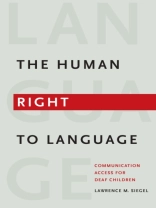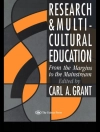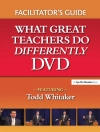In 1982, the United States Supreme Court ruled that Amy Rowley, a deaf six-year-old, was not entitled to have a sign language interpreter in her public school classroom. Lawrence Siegel wholeheartedly disagrees with this decision in his new book The Human Right to Language: Communication Access for Deaf Children. Instead, he contends that the United States Constitution should protect every deaf and hard of hearing child s right to communication and language as part of an individual s right to liberty. Siegel argues that when a deaf or hard of hearing child sits alone in a crowded classroom and is unable to access the rich and varied communication around her, the child is denied any chance of success in life.In The Human Right to Language, Siegel proposes that the First and Fourteenth Amendments of the Constitution be enforced so that Amy Rowley and her peers can possess that which virtually every other American child takes for granted the right to receive and express thought in school. He asserts that the common notion of a right to speech is too infrequently interpreted in the narrowest sense as the right to speak rather than the broader right to receive and transmit information in all ways. Siegel reveals that there are no judicial decisions or laws that recognize this missing right, and offers here a legal and constitutional strategy for change. His well-reasoned hypothesis and many examples of deaf children with inadequate communication access in school combine to make a compelling case for changing the status quo.
Lawrence Siegel
Human Right to Language [PDF ebook]
Communication Access for Deaf Children
Human Right to Language [PDF ebook]
Communication Access for Deaf Children
Beli ebook ini dan dapatkan 1 lagi PERCUMA!
Bahasa Inggeris ● Format PDF ● ISBN 9781563684210 ● Penerbit Gallaudet University Press ● Diterbitkan 2009 ● Muat turun 3 kali ● Mata wang EUR ● ID 5372928 ● Salin perlindungan Adobe DRM
Memerlukan pembaca ebook yang mampu DRM












